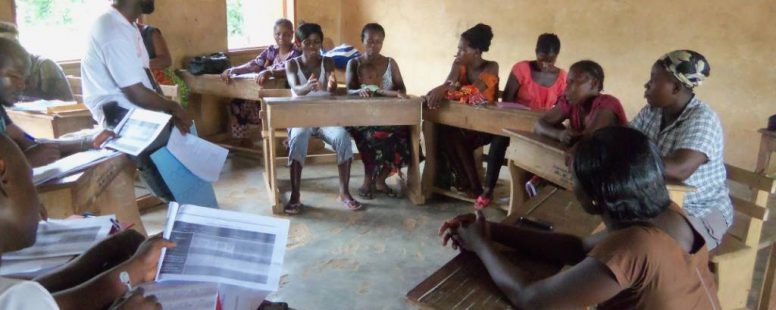Tracking Millennium Development Goals (MDGs)
On the 20th to 24th June 2014, Alliance for Reproductive Health Rights (ARHR) in collaboration with Young and Lonely Foundation (YLF) undertook a research activities aimed at tracking Millennium Development Goals (MDGs) 4 and 5 and the progress made so far using certain indicators as yardstick.
Dr. Delali Badasu who works with the centre for migration studies, University of Ghana. Senior Lecturer University of Ghana and a research fellow at the Regional institute for population studies, Dr. Ben Kwansa: Lecturer, Institute for African Studies University of Ghana, and Dr. Deborah Atobrah: Lecturer, Institute for African Studies, University of Ghana took the data collectors and note takers through training to equip them with data collection skills. During the training, the participants were divided into two groups to discuss what have been studied.
After the training, participants were divided into two groups to do a pre-test in Nyamedam and Yaluwa Zongo and this was done successfully. After the pre-test, various dates were scheduled for data collectors to engage their clients on the field. In the case of Agona East, the data collection started on 20th June 2014 and ended on 24th June, 2014. The communities that were used for the data collection are Mansofo, Namanwura, Otabilkwa.
The groups that were sampled for the data collection were in three categories namely mothers focus group, adolescent boys focus group and adolescent girls focus group,
The focus group ‘A, MOTHERS. The indicators for the data collection can be seen below:
- Investigate functionality of the NHIS
- Antenatal Care Services
- Supervised Deliveries
- Post-natal Care
- Family Planning
- Abortion Care
- Alternative MHC Services
- Male involvement in MHC
- Immunization
- Suggestions related to the rights to services
- Suggestions for improving health outcomes for mothers
Main health facility used by mothers, Dist.: ………km Travel time: …….min
The focus group ‘B, Adolescent Boys and Girls. The indicators for the data collection can be seen below:
- Investigate functionality of the NHIS
- Access to contraceptives
- Access to relevant information on reproductive health
- Access to adolescent counseling services
- Are services youth-friendly?
- Level of stigma and discrimination around contraception and abortion
- Teen-age pregnancy
- Ability to negotiate safe sex
- Average age at first sexual intercourse
- Average number of simultaneous sexual partners
- Suggestions related to the rights to services
- Suggestions for improving health outcomes for adolescents
Main health facility used by adolescents, Dist.: ……km Travel time: …….min
The trainers also came to the communities to supervise what the data collectors are doing in the field.
The findings are amazing as clients were comfortable in coming out with issues that reflects their conditions as far as health is concern.
The Young and Lonely Foundation (YLF) team that took part in the data collection are:
Gilbert Germain- moderator
Philip Doe Amaglo- note taker
Mohammed Mumuni- note taker
Esther Pinkrah- Organizer and Photo Taker
Osbert Aniaku from Ghana Health Service (GHS) Nsaba, also as note taker
Patricia Opoku Affriyie- Supervisor from ARHR





